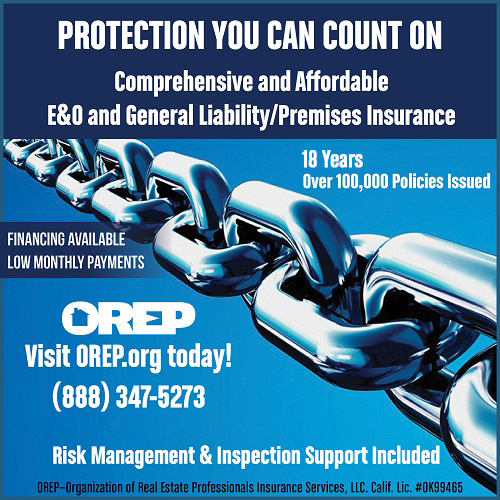 |
> E&O/GL Insurance for Home Inspectors Competitive Rates, Broad Coverage, Free Risk Management, online inspection support for tough questions, discounts on education and more… Professional Coverage, Competitive Pricing Shop OREP today! |
Dealing with Price Shoppers
by Ian Robertson, Inspector ToolBelt
As a home inspector, we have all received a similar phone call or email where the first words out are “How much do you charge?” or “So-and-so only charges $199 for a home inspection, can you match that?” For most of us, those words (and variations thereof) make us cringe.
Price shopping is part of our culture now. When people search for a product or service, the mentality is to go online, check prices, and buy an item where it is cheapest. That’s how I bought my toaster oven. I found the same exact toaster oven on another website for about $5 cheaper, so that is where I bought it. But there is an issue—home inspectors are not toaster ovens. One home inspector is not the same as the next. One home inspector may add more value by using better tools. Another may be more experienced and more thorough. In the end, the mentality of price shopping does not work with the home inspection industry but people do it anyway. And then they complain when they don’t get the inspection they expected.
We have been dealing with price shoppers for many years, and over the years we have developed some tips and tricks to help convert them into full paying clients and other tips and tricks to know when to just drop them.
Convert Price Shoppers Into Paying Clients (Without Changing Your Prices)
What are your options with price shoppers? Over the years and thousands of inspections, we have narrowed it down to only three options when it comes to a price shopper.
1. Give into their price model (not suggested): too many inspectors give into this when they get a lot of phone calls from price shoppers. But there are a few problems with this. First, this is no way to run a business. We have one of the few industries where every year our rates go down instead of up. With that business model, you will be barely scraping by doing inspections given enough time. Another reason you shouldn’t give in is that it changes the dynamic with your client. You appear easily pushed over and maybe even a little desperate. Now they will be more inclined to expect/demand extras from you during the inspection. This is the type of situation where if they think they can push you around, they will most likely be calling with complaints after they move in.
2. Ignore them: I’ll be honest, this was my favorite option for quite some time, and still is on certain days (I’m only human). If someone is going to call us, tell us we are the best inspectors in town, that everyone recommends us, and then ask for a cheaper rate, then I am very inclined to say “No thank you, have a nice day.” On a side note, this can help convert a price shopper sometimes but we will discuss that in a minute.
3. Try to convert the price shopper into a full-paying client: This conversion takes forethought and planning. Turning a price shopper into a full-paying client is a skill but one that is easily developed with the right mentality and practice.
(story continues below)
After we broke things down into these three options it helped us see things a bit clearer. We only choose options two and three now, depending on the time of year. In the busy season option two—ignore them—is our go-to option, but option three is helpful in the slower season. But not all of us are established home inspection companies that have the liberty to turn down clients, so let’s talk about how we can actually convert price shoppers.
Make Them Full-Paying Clients
I will start this section by saying this—be prepared for rejection at first. Once you get it down and you can read the situations better you will convert those price shoppers really well (we convert about 70%–80%). But at first, it’s a bit of an experiment. Like any new skill, it takes time to hone. So let’s go over a few “tricks” to help you convert price shoppers. These are all things
that have worked for us, but pick and choose what you will use based on your personality and style.
Keep them talking: This is an old sales trick. The longer you can keep someone talking with you, the more likely you are to close the sale. The premise of this “trick” is that people are more inclined to trust someone they like instead of a stranger. Also, the longer people talk to you, the more vested they become. Many people have the goal of just keeping a conversation going because with each minute it is more likely to turn the call into a sale. So, get them to like you and keep them talking. I had a car salesman do this to me not long ago. I bought a new vehicle for one of my inspectors. I went up to the salesman and asked him how much that particular vehicle was. I watched him as he did this same trick to me. I knew what he was doing but it still worked! He asked me what I was buying it for, what vehicle I have now, told me about his boss, mentioned his family, told me how much he liked the vehicle, etc. By the time he was done, I liked him. I didn’t think about the price as much because he made me like the vehicle more too. Because I liked him, I also trusted him. So guess who I bought that vehicle from? Actually, I plan on buying another one from him soon.
So, does that dealership have the best price? I have no idea. But I feel taken care of there and I trust them/him. And that is the point—we are inclined to buy something (and even pay more) when we trust/like someone.
We use a 10-minute rule. When a price shopper calls we watch the clock and try to keep them on the phone for at least 10 minutes. I talk about their house, ask questions, and even get talking about my family, their family, where they grew up, etc. I try to not let the conversation end early if at all possible. I typically can close most calls that I can keep going for 10 minutes. Does this seem like a long time to talk? What is better: answering 10 three-minute phone calls without getting an inspection, or spending 10 minutes getting to know a client who hires you and then maybe refers you?
Add Value: This should go without saying, but I will say it. I once had an inspector answer the phone for a few months so he would understand what it takes to schedule. His conversion rate was terrible. It was bad because he would tell them the price and leave it at that—so they never saw the value. He neglected to mention we use infrared, electronic reports, sewer scopes, two inspectors on site, InterNACHI Certified, we are State Certified Inspector Instructors and a million other reasons why we were better.
When a price shopper calls, give them a million reasons to hire you so that the other guys seem like they offer nothing at all. Do you find that you have a short list of things that add value to your company? Then start adding things. Get more certifications and training; add more services; become an expert on various topics through education; add services to your standard inspection, like infrared. Adding value can turn a price shopper into a client, but only if you tell them about it.
Tell Them No: You might recognize this as option two for what to do with a price shopper, but it is also a trick for turning them into a client at times. This takes time and experience to develop when to do this, and when not to do this. I recently had a client contact our company and ask our price and then ask for a discount—I told her no and she hired us. This does not always work, but there have to be a few elements in place.
This particular woman was referred to us by her agent. She also took the time to call us twice. So what did that tell me? It told me she wanted to hire us, that she was interested in us, and she was spending time thinking about us. If she was so interested, then why would I drop the price? Turns out that she viewed us as the premier home inspection company in the area but still wanted to get the price down. She was going to hire us one way or the other, so why drop our price? In the same vein, sometimes telling someone “no” (always very politely) can show them that you are a great inspection company that doesn’t need to lower prices to get work. That often will make the client think twice about price shopping. So telling someone “no” can actually make your company look more appealing. Again, always be very polite and professional when telling people no, leaving an opening for them to come back and hire you at full price.
Don’t Talk Price: You will eventually have to mention the price, but mention the price and then move on to why they should hire you, and only after you have built a rapport with them. Mention price in mid-sentence and not at the end of a sentence. For instance: “I see that we have an opening for next week for 1:00 pm on Tuesday; the price of the inspection is $500, which includes the roof, exteriors, heating, cooling, electrical, basement, attic, and everything in between. It also includes your professional infrared scan….”—you get the point.
Close the Deal
So those are the “tricks” that we use to close deals with price shoppers. It isn’t complicated or fancy but does take time and practice. Ultimately, closing the deal is key. Without beating a dead horse, in the conversation with a potential client always keep the goal of closing the deal at the forefront of your mind. Make it easy for them to schedule with you (another reason to have online scheduling). Closing the deal means not leaving things open. Instead of asking them if they would like to schedule, tell them your openings and ask them which one they would like.
The point is not to be pushy, but focused, polite, and to build a rapport with each of the price shoppers who call you. You won’t win them all but the more you do, the better you will get at converting price shoppers into clients.
About the Author
Ian Robertson is a veteran home inspector, owner of three inspection companies, owner of Full View Home Inspector Marketing, and one of the founders of Inspector Toolbelt. Inspector Toolbelt is simple administrative and scheduling software for home inspectors that makes running your inspection business easy and automated.
Free Risk Management Online Course Claims and Complaints: How to Stay Out of Trouble
Available Now
Presenter: David Brauner, Senior Insurance Broker OREP
David Brauner, Senior Broker at OREP, shares insights and advice gained over 25+ years of providing E&O insurance for inspectors, showing you how to protect yourself and your business. Watch Now!
Note: The Winter 2020 issue of Working RE Inspector is mailing now to over 25,000 home inspectors nationwide. OREP Insureds enjoy guaranteed delivery of each print magazine and many more benefits.



